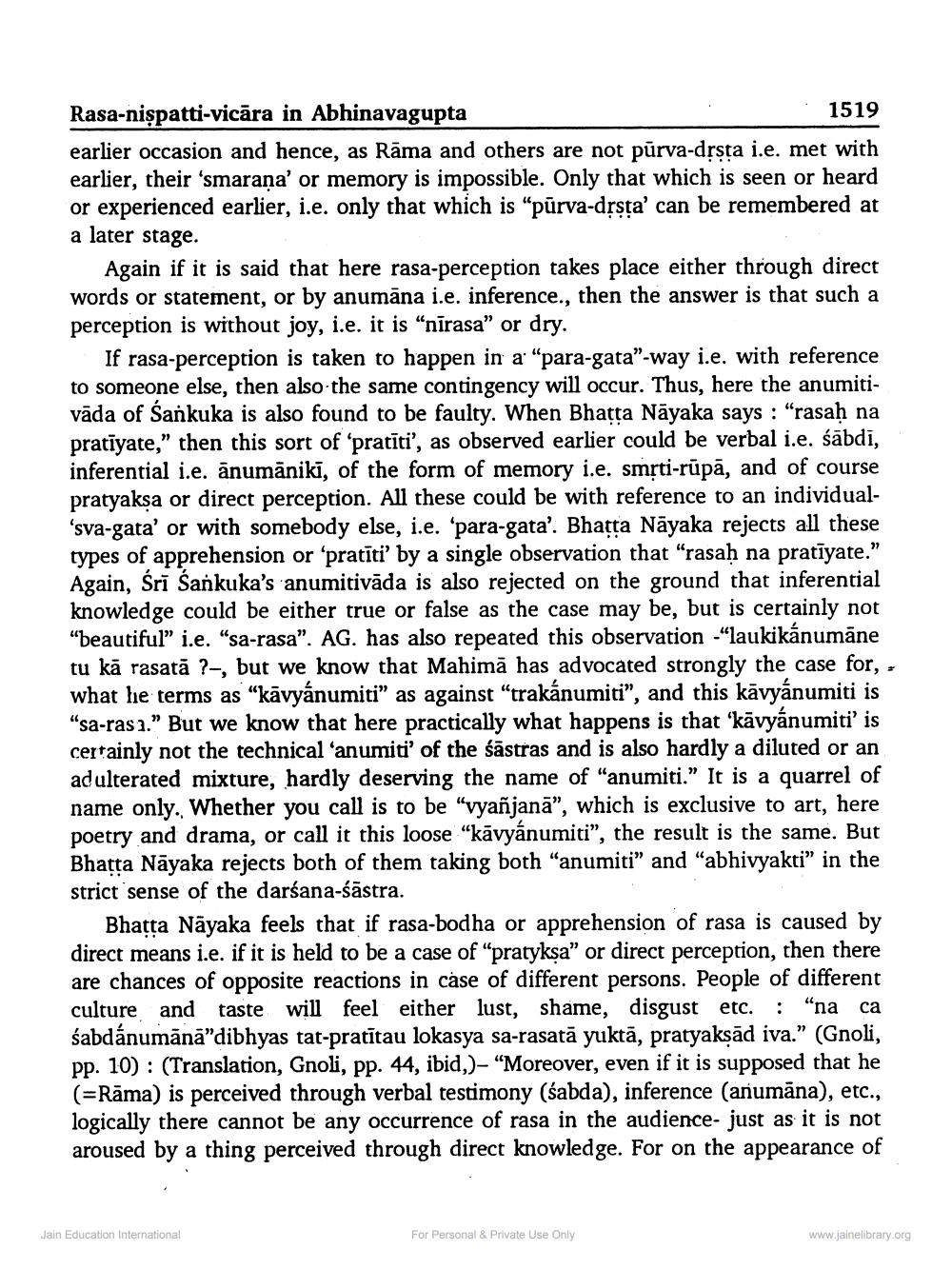________________
Rasa-nispatti-vicāra in Abhinavagupta
1519 earlier occasion and hence, as Rāma and others are not pūrva-drsta i.e. met with earlier, their 'smarana' or memory is impossible. Only that which is seen or heard or experienced earlier, i.e. only that which is “pūrva-drsța' can be remembered at a later stage.
Again if it is said that here rasa-perception takes place either through direct words or statement, or by anumāna i.e. inference., then the answer is that such a perception is without joy, i.e. it is "nīrasa" or dry.
If rasa-perception is taken to happen in a “para-gata”-way i.e. with reference to someone else, then also the same contingency will occur. Thus, here the anumitivāda of Sankuka is also found to be faulty. When Bhatta Nāyaka says : “rasaḥ na pratīyate," then this sort of 'pratīti', as observed earlier could be verbal i.e. śābdi, inferential i.e. anumānikī, of the form of memory i.e. smsti-rūpā, and of course pratyaksa or direct perception. All these could be with reference to an individual'sva-gata' or with somebody else, i.e. 'para-gata'. Bhatta Nāyaka rejects all these types of apprehension or 'pratīti' by a single observation that “rasah na pratīyate." Again, Sri Sankuka's anumitivāda is also rejected on the ground that inferential knowledge could be either true or false as the case may be, but is certainly not "beautiful" i.e. "sa-rasa". AG. has also repeated this observation -"laukikanumāne tu kā rasatā ?-, but we know that Mahimā has advocated strongly the case for, . what he terms as “kāvyánumiti" as against "trakánumiti", and this kävyánumiti is "sa-rasa." But we know that here practically what happens is that 'kävyánumiti' is certainly not the technical anumiti' of the śāstras and is also hardly a diluted or an adulterated mixture, hardly deserving the name of "anumiti.” It is a quarrel of name only. Whether you call is to be "vyañjanā”, which is exclusive to art, here poetry and drama, or call it this loose "kāvyánumiti", the result is the same. But Bhatta Nāyaka rejects both of them taking both "anumiti" and "abhivyakti” in the strict sense of the darśana-śāstra.
Bhatta Nāyaka feels that if rasa-bodha or apprehension of rasa is caused by direct means i.e. if it is held to be a case of “pratyksa” or direct perception, then there
e chances of opposite reactions in case of different persons. People of different culture and taste will feel either lust, shame, disgust etc. : “na ca sabdánumānā"dibhyas tat-pratītau lokasya sa-rasata yuktā, pratyaksād iva.” (Gnoli, pp. 10) : (Translation, Gnoli, pp. 44, ibid,)- “Moreover, even if it is supposed that he (=Rāma) is perceived through verbal testimony (śabda), inference (anumāna), etc., logically there cannot be any occurrence of rasa in the audience- just as it is not aroused by a thing perceived through direct knowledge. For on the appearance of
Jain Education International
For Personal & Private Use Only
www.jainelibrary.org




